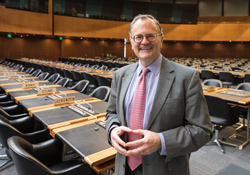The WTO: A forum for trade
October 02, 2017
In the game of international trade, countries will always try to pursue the best arrangements possible for their own citizens. But no game can be played without a referee to ensure all the players follow the rules agreed upon beforehand. Often misunderstood is the fact that institutions like the World Trade Organization, or WTO, act as this referee.
 Keith Rockwell, director for WTO’s Information and External Relations Division
Although the WTO was founded in its current format in 1995, it traces its origins back to the period right after World War II and the General Agreement on Tariffs and Trade. In successive rounds of negotiations that take years, the WTO has expanded its membership and the aspects of trade that it covers.
Keith Rockwell, director for WTO’s Information and External Relations Division
Although the WTO was founded in its current format in 1995, it traces its origins back to the period right after World War II and the General Agreement on Tariffs and Trade. In successive rounds of negotiations that take years, the WTO has expanded its membership and the aspects of trade that it covers.
“This is a forum, a forum of member governments. Today we have 164,” said Keith Rockwell, director for WTO’s Information and External Relations Division, at the organization’s headquarters in Geneva. “At the root of this forum is a contract between governments where they pledge to do things in a predictable way.”
Politicians, pundits and everyday people in many countries might rail against the WTO by claiming that it takes away national sovereignty, but the reality is that it’s simply an institution designed to help countries negotiate with each other.
 Vonai Muyambo, external relations officer at the WTO
“It’s our members that make decisions, not us sitting in the Secretariat’s office in Geneva,” said Vonai Muyambo, external relations officer at the WTO. “All of our members have to sit down and decide, by consensus, whether something will go ahead or not.”
Vonai Muyambo, external relations officer at the WTO
“It’s our members that make decisions, not us sitting in the Secretariat’s office in Geneva,” said Vonai Muyambo, external relations officer at the WTO. “All of our members have to sit down and decide, by consensus, whether something will go ahead or not.”
While the WTO doesn’t have authority over nations, it does help them resolve disputes.
This is a crucial function of the organization, because while trade is beneficial, that doesn’t mean it’s easy. Countries constantly disagree about precisely what their obligations are to one another under existing trade agreements. For instance, although Canada, the U.S. and Mexico have had the North American Free Trade Agreement (NAFTA) in force for more than two decades, and the countries are one another’s largest trading partners, they still argue over whether the others are playing fairly. Their disagreements often end up being sorted out in front of the WTO.
“We have almost a universal or global membership, and of course members have different views about how to advance their trade interests,” said Tatiana Prazeres, senior advisor to the Director-General of the WTO. “What we try to do is to facilitate dialogue and conversations and understanding among members so that they can advance the trade rules.”
The challenge, as has been frequently noted in discussions of why trade fails to win broad support, is that it can often be very politically beneficial in the short term to impose trade restrictions even on longstanding partners. The benefits of keeping markets open can be more complex to convey and frequently take longer to develop.
“It’s so viscerally satisfying in some respects to whack the other guy, the one you think is not being fair,” said Dan Pearson, a fellow at the Cato Institute who studies trade and who formerly worked at Cargill. “But it’s been very well understood for decades that any time a country raises an import barrier, it lowers its own economic welfare. The potential benefits to domestic producing industries are outweighed by the harm done to consumers.”
This is why Cargill is taking a more proactive, public stance to defend the many merits of international trade. At a major commodities conference in Switzerland in March sponsored by The Financial Times, Chairman and CEO Dave MacLennan delivered a robust keynote address in support of trade, and subsequent media appearances and other public engagements by Cargill leaders have included a similar perspective. They have defended not only trade, but the institutions like the WTO that enable it to take place.
“The WTO matters,” MacLennan said at the conference. “Imagine critical commodities – food, oil, metals and manufactured goods – used as bargaining chips at every turn. It’s a world none of us want to see. Trade facilitates prosperity and peace by helping us connect and share talent, ideas and markets.”
